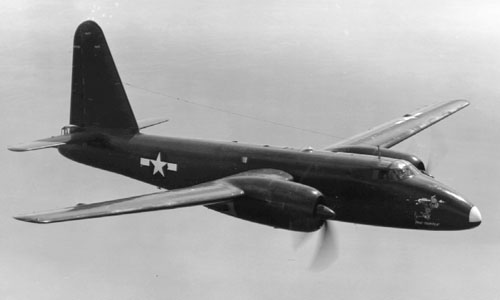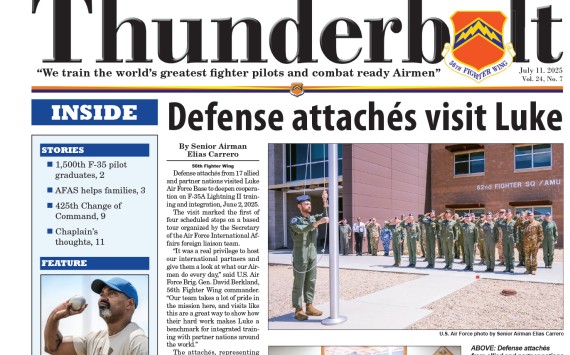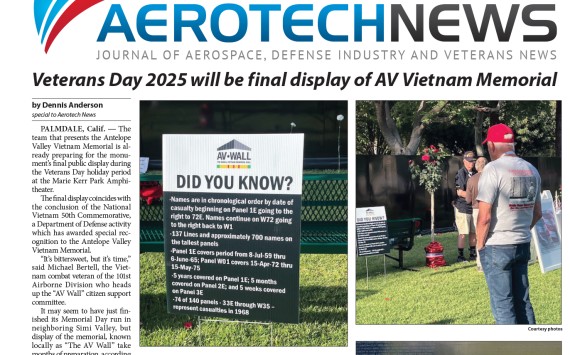When Dick Rutan and Jeana Yeager completed their historic Voyager flight here in the Antelope Valley in December 1986, they broke numerous aviation records. One in particular that lends itself to a good story, was a record held by a piston-powered aircraft which stood for 40 years. Thinking back to those history-making flights, it always makes me wonder how a flight crew could endure long distance flights in such cramped conditions, when today’s long distance air travel has many of us enjoying the comforts of wide-body jets, but still longing for the moment when the flight is over.
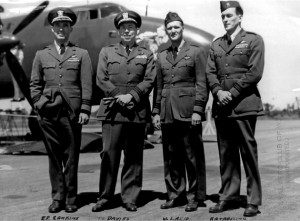
Back in the 1940s in Burbank, Calif., Lockheed’s new P2-V Neptune Navy patrol planes were rolling off the production line. Chief of Naval Operations, Fleet Adm. Chester Nimitz, looking to extend the ranges of patrol aircraft, came up with an idea for one of those P2-V’s that probably looked like a great opportunity for a crew to get some serious flight pay money. The memo he crafted in July 1946 read as follows: “For the purpose of investigating means of extension of present patrol aircraft ranges, physiological limitations on patrol plane crew endurance and long-range navigation by pressure pattern methods, it is proposed to make a nonstop flight of a P2V-1 aircraft from Perth, Australia, to Washington, D.C., with the possibility, weather permitting, of extending the flight to Bermuda.”
This intended route would exceed the record set by an Army Air Force B-29 Superfortress by some 4,000 miles. The mission would also demonstrate the P2-V Neptune’s ability to cover the transoceanic distances necessary to perform its anti-submarine warfare and sea-surveillance functions. The message would be unmistakable at home and abroad: the U.S. Navy could reach virtually any point on the globe, if it chose to do so.
Cmdr. Thomas Davies would oversee the mission and all the details. The Navy approved the flight and a crew was selected that included Capt. Eugene Rankin, Cmdr. Walter S. Reid and Lt. Cmdr. Roy Tabling. After all the details were worked out, the crew traveled to Burbank to oversee the modifications of a special P2-V Neptune for the task. With modifications that stripped all of the aircraft’s armament, added an extended nose and saw the installation of additional fuel tanks the plane, after much flight test, was sent on its way to Perth, Australia.
Just before the P2-V Neptune left, it had one last task to be performed on it. The project, now officially known as “Operation Turtle”, had a visitor from Disney Studios and the insignia of the “Truculent Turtle’’ was painted on the nose of the aircraft. It depicted a determined turtle, astride a bicycle sprocket turning a propeller. He is smoking a pipe and carrying a rabbit’s foot on a keychain, as a symbol of his victory in the race against the hare. (The turtle vs. the hare symbolized the competition at the time between the Navy and the Army air forces.)
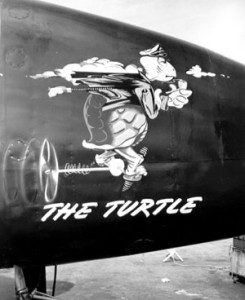
In September, a Navy R5D Skymaster left Burbank with four Lockheed technicians, crewmen and support personnel, along with equipment and spare parts needed to service the Turtle while in Perth. Upon arriving, there was much buzz about Operation Turtle and the preparations had turned into a media circus. Press and local dignitaries all wanted to be around, and it was determined that a couple of demonstration flights would be added to appease the locals and remove all the distractions from around the airfield.
Finally, there came the day the Turtle was declared ready for the flight. The aerologist advised that the best day to depart weather-wise was approaching fast, so Sept. 29 was chosen. The P2-V Neptune was moved to the Pearce Airdrome at the Royal Australian Air Force field north of Perth. Take off was scheduled for 1800 hours, which would put the aircraft over the west coast of the United States at about 9 p.m. two days later, and over Washington, D.C., at about noon on the third day.
On Sept. 29, 1946, late in the afternoon, the Truculent Turtle was poised on the runway and ready to go.
In the next issue, we will fly along with the Turtle and its crew as it sets a record for flight endurance not only for the plane, but for the crew that probably could not make enough coffee to keep up with the demand!
Until next time, Bob out…






